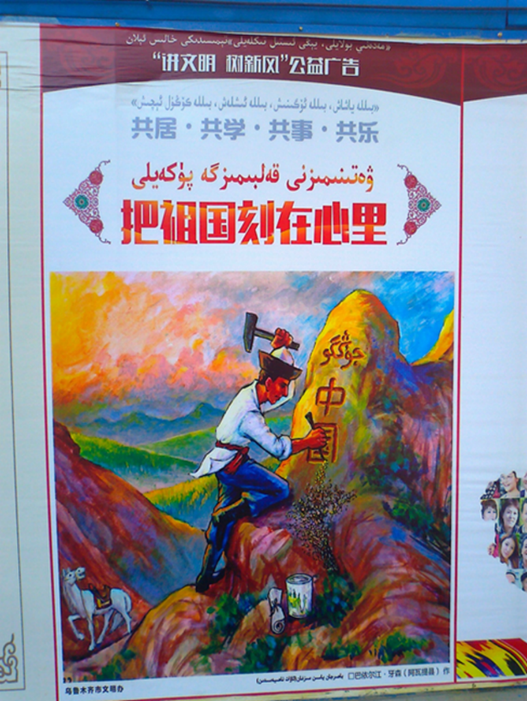Wed 1st – Fri 3rd September 2021
The Boiler House & Armstrong Building (1.06 & G42RB), Newcastle University
Xinjiang Crisis Conference Programme (Revised 18th Aug)
Xinjiang Conference Abstracts Booklet

Background:
For the past four years, the region of Xinjiang in Northwest China has witnessed the largest forced incarceration of an ethno-religious minority anywhere in the world since the Second World War: upwards of one million Uyghurs and other Turkic Muslims have been forced into internment camps for “re-education” and “thought transformation,” or into high-security prisons, or situations of forced labour. In June 2020, this situation came to the wider attention of the world when the word “genocide” – unqualified by the modifier “cultural” – was used to describe it. The word “genocide” (in the sense of full, physical genocide) gained widespread currency in scholarly, media and legal circles at this time because of the publication of a detailed academic report on forced sterilizations among Turkic women and a drastic decrease in births in the Uyghur population in recent years (Adrian Zenz 2020) and the Associated Press article that built upon it (29 June 2020). Zenz’s report provided a body of Chinese governmental statistics and documents that constituted new evidence to support earlier eyewitness claims of suppression of female menstruation in the Xinjiang detention facilities. Simultaneously, other reports drew attention to the seizure by federal authorities in New York of a shipment of weaves made out of human hair, suspected to have been cut from, and likely processed by, people detained in an internment camp in Xinjiang’s Lop County. For some in the international community, the coincidence of these reports produced alarming echoes of the Holocaust. Since then, the label “genocide” is being increasingly discussed by a growing number of scholars, activists, rights advocates, barristers, and politicians, as they consider the diverse legal and diplomatic channels that might be pursued to hold the PRC government to account.
In July 2020, the Bar Human Rights Committee of England and Wales (BHRC) released a briefing paper titled “Responsibility of States under International Law to Uyghurs and other Turkic Muslims in Xinjiang, China.” In it, leading UK human rights barristers led by Schona Jolly QC observed that China’s refusal to be held legally accountable for widely documented allegations concerning its actions in Xinjiang does not absolve the global community of responsibility. Referring to “grave allegations of crimes against humanity,” the BHRC report states that countries should use all available means, including international law, to call upon China to cease human rights violations in Xinjiang, to allow independent investigations into allegations of “genocide, murder, extermination, torture, and other forms of ill-treatment, and enslavement”, and to prosecute offenders. That same month, London-based international barrister Rodney Dixon QC submitted a complaint to the International Criminal Court, calling for an investigation into senior Chinese officials for genocide and crimes against humanity; in December 2020, the ICC ruled that there was insufficient evidence to open an investigation, but has kept the file open. In February 2021, senior barristers at Essex Court Chambers in London concluded in a legal opinion that there is “a very credible case that acts carried out by the Chinese government against the Uighur people in Xinjiang Uighur Autonomous Region amount to crimes against humanity and the crime of genocide.” This was swiftly followed by a report from Newlines Institute for Strategy and Policy in March 2021, in which dozens of experts in international law, genocide studies, Chinese ethnic policies, and the Uyghur region examined pro bono available evidence and found that China is in breach of the UN Genocide Convention (1948).
At the government level, seven countries have declared that China’s actions in Xinjiang constitute genocide as laid out in the UN Convention or identified a ‘risk of genocide,’ including the US, Canada, Holland, UK, Lithuania, Czech Republic and Belgium.
The Event
This 3-day “blended” (in-person and virtual) international conference at Newcastle University brings globally leading scholars in Xinjiang/Uyghur, Law and Genocide studies together with international barristers, NGO representatives, human rights advocates, activists, think tank experts and UK politicians. Taking place alongside an inter-faith solidarity event co-organised with Newcastle Council of Faiths, the event encourages debate on the following questions:
- How might we best understand human rights violations in Xinjiang: as genocide, ethnocide (cultural genocide) or crimes against humanity?
- What types of evidence do we have to support a charge of (cultural) genocide or crimes against humanity?
- To what extent is it possible to demonstrate PRC state intent to commit genocide?
- Is the label of genocide desirable or useful when attempting to hold the PRC government to account?
- Beyond legal channels, what other strategies might be employed to pursue PRC accountability?
- How effective might symbolic, diplomatic actions prove (e.g. a diplomatic boycott of the 2022 Winter Olympic Games in Beijing)?
- How much impact can economic sanctions have, such as the pursuit of corporate due diligence (e.g. regarding cotton and solar panel imports)?
This event dovetails with Newcastle University’s Social Justice agenda, in particular its work on race, religion and migration (exclusion among minority groups; religious discrimination) and on peace, reconciliation and human rights.
Organised by:
Joanne Smith Finley (School of Modern Languages, Newcastle University)
Hanna Burdorf (School of Modern Languages, Newcastle University)
Nick Megoran (School of Geography, Sociology and Politics, Newcastle University)
Partners / Collaborators:
- Bar Human Rights Committee of England & Wales
- Newcastle Council of Faiths
- The Cordoba Foundation
- Human Rights Watch
- Newlines Institute for Strategy and Policy
- The Rights Practice
- Gesellschaft für bedrohte Völker (Society for Threatened Peoples)
- Uyghur Human Rights Project
- René Cassin – The Jewish Voice for Human Rights
- Jewish Movement for Uyghur Freedom
- Raoul Wallenberg Centre for Human Rights

